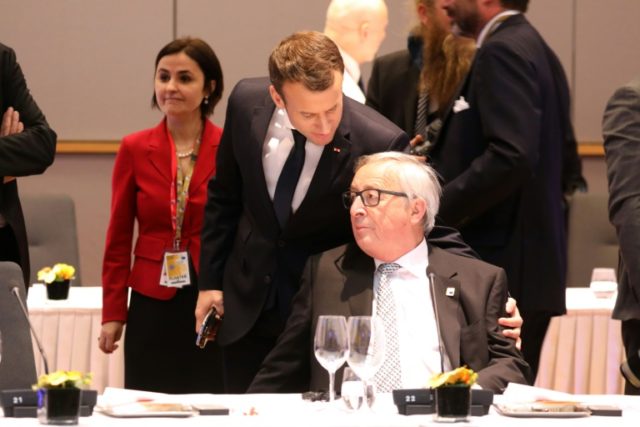Brussels (AFP) – European Union leaders faced calls at a Brussels summit on Friday to “pay more” to fill a Brexit-sized hole in their budget or accept cuts.
The 27 heads of state or government, minus the British prime minister, were divided on how to deal with a funding gap of up to 15 billion euros a year after Britain leaves next year.
“If we want to have new priorities, and we can’t reduce to the right extent old policies, then countries have to pay more,” warned European Commission president Jean-Claude Juncker.
The Netherlands, Denmark, Sweden and Austria, which all pay more into the EU than they get out, are strongly opposed to increasing the coming multi-year budget.
The current seven-year budget of almost one trillion euros runs out in 2020.
“What we don’t want is the weight of a constant increase in spending pressing down on net contributors,” Austrian Chancellor Sebastian Kurz said as he arrived.
Dutch Prime Minister Mark Rutte said that “by modernising the budget we can free up money for new priorities” including migration, defence and cybersecurity.
– Merkel’s ‘money for migrants’ –
German Chancellor Angela Merkel’s plan to tie regional funding for poorer states to the willingness to take in refugees was particularly divisive.
There have also been suggestions that the funding should be made conditional on obeying the rule of law, seen as a shot across the bows to Poland and other Eastern European governments.
European Parliament chief Antonio Tajani backed the plans, saying those who did not show “solidarity” and “do not respect union rules must pay the price for that.”
Juncker however warned against going too far. “I’m very worried that there is this gap between east and west. I don’t want a new divide in Europe, we have enough of that”.
The European Commission, the powerful executive arm of the EU, has called for spending to increase to between 1.1 percent and 1.2 percent of EU countries’ GDP, up from 1.0 percent in the current budget.
Brussels has suggested cuts to agricultural funds, which is sure to anger farmers from major producer France, and payments to poorer regions, which Eastern European states will oppose.
European Council President Donald Tusk — who represents the member states — said it was “unrealistic” to expect any agreement on the budget before the 2019 European elections, pointing out that the last budget took 29 months.
– ‘Spitzenkandidat’ row –
The European leaders were far more united on another post-Brexit issue: how to choose a new European Commission chief after former Luxembourg premier Juncker steps down in 2019.
Juncker was appointed in 2014 under an agreement whereby the European Parliament would choose a “Spitzenkandidat” or lead candidate, and the European Council of leaders would “take into account” their choice.
But the leaders rejected calls by the European Parliament for their next candidate to be guaranteed the job after the European elections in May 2019.
“There was full agreement there can be no automaticity. It is an autonomous decision for the leaders,” a senior EU official said.
The leaders were united against other efforts to water down their powers, including merging Tusk’s job with Juncker’s, and decreasing the size of the European Commission, which currently has one commissioner per country.
“All who spoke were against” both plans, the official said, adding that the merger of the jobs was now “off the table.”
British Prime Minister Theresa May is excluded from the meeting in Brussels, the latest in a series of special EU summits aimed at charting a roadmap following Britain’s shock 2016 vote to quit the bloc.
Tusk will tell leaders on Friday that he expects to go ahead as planned at a summit in March and issue Brexit negotiating guidelines on the future EU-Britain relationship, officials said.
May will finally unveil her vision for future EU ties next week, London said, after she chaired an eight-hour cabinet meeting at her country retreat on Thursday to thrash out a plan.
When asked for his thoughts about the meeting, Juncker quipped: “I am not the British prime minister, it would be good for Britain if I was.”

COMMENTS
Please let us know if you're having issues with commenting.